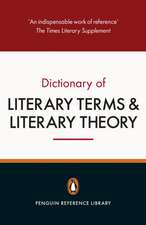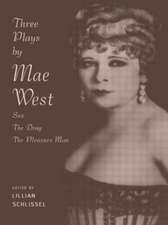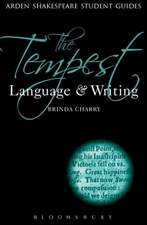George Orwell, Doubleness, and the Value of Decency: Studies in Major Literary Authors
Autor Anthony Stewarten Limba Engleză Paperback – 18 dec 2015
| Toate formatele și edițiile | Preț | Express |
|---|---|---|
| Paperback (1) | 436.14 lei 6-8 săpt. | |
| Taylor & Francis – 18 dec 2015 | 436.14 lei 6-8 săpt. | |
| Hardback (1) | 1003.99 lei 6-8 săpt. | |
| Taylor & Francis – 29 iul 2003 | 1003.99 lei 6-8 săpt. |
Din seria Studies in Major Literary Authors
- 18%
 Preț: 1052.35 lei
Preț: 1052.35 lei -
 Preț: 427.12 lei
Preț: 427.12 lei - 18%
 Preț: 699.21 lei
Preț: 699.21 lei - 18%
 Preț: 1000.51 lei
Preț: 1000.51 lei - 18%
 Preț: 1054.58 lei
Preț: 1054.58 lei - 18%
 Preț: 1054.27 lei
Preț: 1054.27 lei - 18%
 Preț: 1111.87 lei
Preț: 1111.87 lei -
 Preț: 367.83 lei
Preț: 367.83 lei -
 Preț: 432.63 lei
Preț: 432.63 lei -
 Preț: 351.66 lei
Preț: 351.66 lei -
 Preț: 484.04 lei
Preț: 484.04 lei -
 Preț: 437.28 lei
Preț: 437.28 lei - 18%
 Preț: 1050.78 lei
Preț: 1050.78 lei - 18%
 Preț: 1055.51 lei
Preț: 1055.51 lei - 26%
 Preț: 819.48 lei
Preț: 819.48 lei - 18%
 Preț: 945.01 lei
Preț: 945.01 lei - 18%
 Preț: 726.42 lei
Preț: 726.42 lei -
 Preț: 353.72 lei
Preț: 353.72 lei - 26%
 Preț: 763.78 lei
Preț: 763.78 lei - 26%
 Preț: 819.09 lei
Preț: 819.09 lei - 18%
 Preț: 1051.55 lei
Preț: 1051.55 lei -
 Preț: 369.18 lei
Preț: 369.18 lei - 18%
 Preț: 701.56 lei
Preț: 701.56 lei - 26%
 Preț: 763.78 lei
Preț: 763.78 lei - 26%
 Preț: 819.48 lei
Preț: 819.48 lei -
 Preț: 485.32 lei
Preț: 485.32 lei - 18%
 Preț: 1057.05 lei
Preț: 1057.05 lei - 26%
 Preț: 817.46 lei
Preț: 817.46 lei - 18%
 Preț: 1055.51 lei
Preț: 1055.51 lei -
 Preț: 435.17 lei
Preț: 435.17 lei - 18%
 Preț: 1114.70 lei
Preț: 1114.70 lei - 18%
 Preț: 1055.51 lei
Preț: 1055.51 lei -
 Preț: 432.20 lei
Preț: 432.20 lei - 18%
 Preț: 707.26 lei
Preț: 707.26 lei - 26%
 Preț: 817.05 lei
Preț: 817.05 lei - 18%
 Preț: 1059.84 lei
Preț: 1059.84 lei - 18%
 Preț: 1002.95 lei
Preț: 1002.95 lei - 18%
 Preț: 1058.43 lei
Preț: 1058.43 lei - 18%
 Preț: 1057.89 lei
Preț: 1057.89 lei - 18%
 Preț: 1002.60 lei
Preț: 1002.60 lei - 26%
 Preț: 817.46 lei
Preț: 817.46 lei - 18%
 Preț: 997.90 lei
Preț: 997.90 lei - 18%
 Preț: 1001.07 lei
Preț: 1001.07 lei
Preț: 436.14 lei
Nou
Puncte Express: 654
Preț estimativ în valută:
83.46€ • 86.61$ • 69.76£
83.46€ • 86.61$ • 69.76£
Carte tipărită la comandă
Livrare economică 15-29 martie
Preluare comenzi: 021 569.72.76
Specificații
ISBN-13: 9781138975149
ISBN-10: 1138975141
Pagini: 216
Ilustrații: black & white illustrations
Dimensiuni: 152 x 229 x 12 mm
Greutate: 0.45 kg
Ediția:1
Editura: Taylor & Francis
Colecția Routledge
Seria Studies in Major Literary Authors
Locul publicării:Oxford, United Kingdom
ISBN-10: 1138975141
Pagini: 216
Ilustrații: black & white illustrations
Dimensiuni: 152 x 229 x 12 mm
Greutate: 0.45 kg
Ediția:1
Editura: Taylor & Francis
Colecția Routledge
Seria Studies in Major Literary Authors
Locul publicării:Oxford, United Kingdom
Notă biografică
Anthony Stewart is Assistant Professor in the English Department at Dalhousie University. His recent publications include "George Orwell's Elastic Politics" in English Studies in Canada and "Penn and Teller Magic: Self, Racial Devaluation, and the Canadian Academy" in Racism, Eh?, an anthology on race and racism in Canada.
Cuprins
Preface Chapter One: On Decency, Doubleness, and Updating Orwell Learning to Write about Orwell Orwell’s Double Consciousness Orwell and Race Orwell as “Elastic-Brow” Orwell’s Critical Sense Decency versus Hypocrisy in Burmese Days, Keep the Aspidistra Flying, Animal Farm, and Nineteen Eighty-Four Chapter Two: Hardly Above Suspicion: Hypocrisy, Decency, and Sincerity in Burmese Days Flory as Ideal Candidate Hypocrisy Exposed Dr. Veraswami—Decency Personified Ellis and the Code of the Pukka Sahib Variations on a Theme Chapter Three: The Secret Art of Not Making Good: Gordon Comstock’s Childish Narrowness in Keep the Aspidistra Flying Gordon Comstock—The Triumph of Pettiness over Doubleness The Decency of Rosemary Waterlow and the Role of Gender Ravelston—Gordon’s Partner in Delusion Decency and Some Conclusions for the Individual Chapter Four: An Absence of Pampering: The Betrayal of the Rebellion and the End of Decency in Animal Farm From 1935 to Nineteen Eighty-Four: Concerns for the Part Become Concerns for the Whole The Rebellion—The Beginning of the End of Decency Consolidating Power and Enforcing the Rules of Indecency Boxer and Decency’s Final Demise Decency and Justice—Is Behaving Decently a Mark of Weakness? Chapter Five: The Heresy of Common Sense: The Prohibition of Decency in Nineteen Eighty-Four Winston Smith and the Desire for Decency Julia and the Citizens of Oceania O’Brien—Imposing the Party’s Final Vocabulary Optimism…After a Fashion Conclusion: Decency or Tolerance? Decency as Concrete Utopia





















